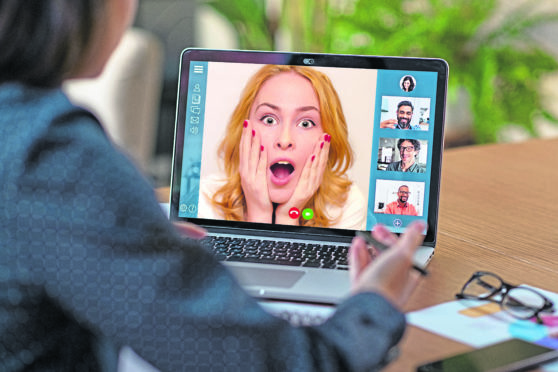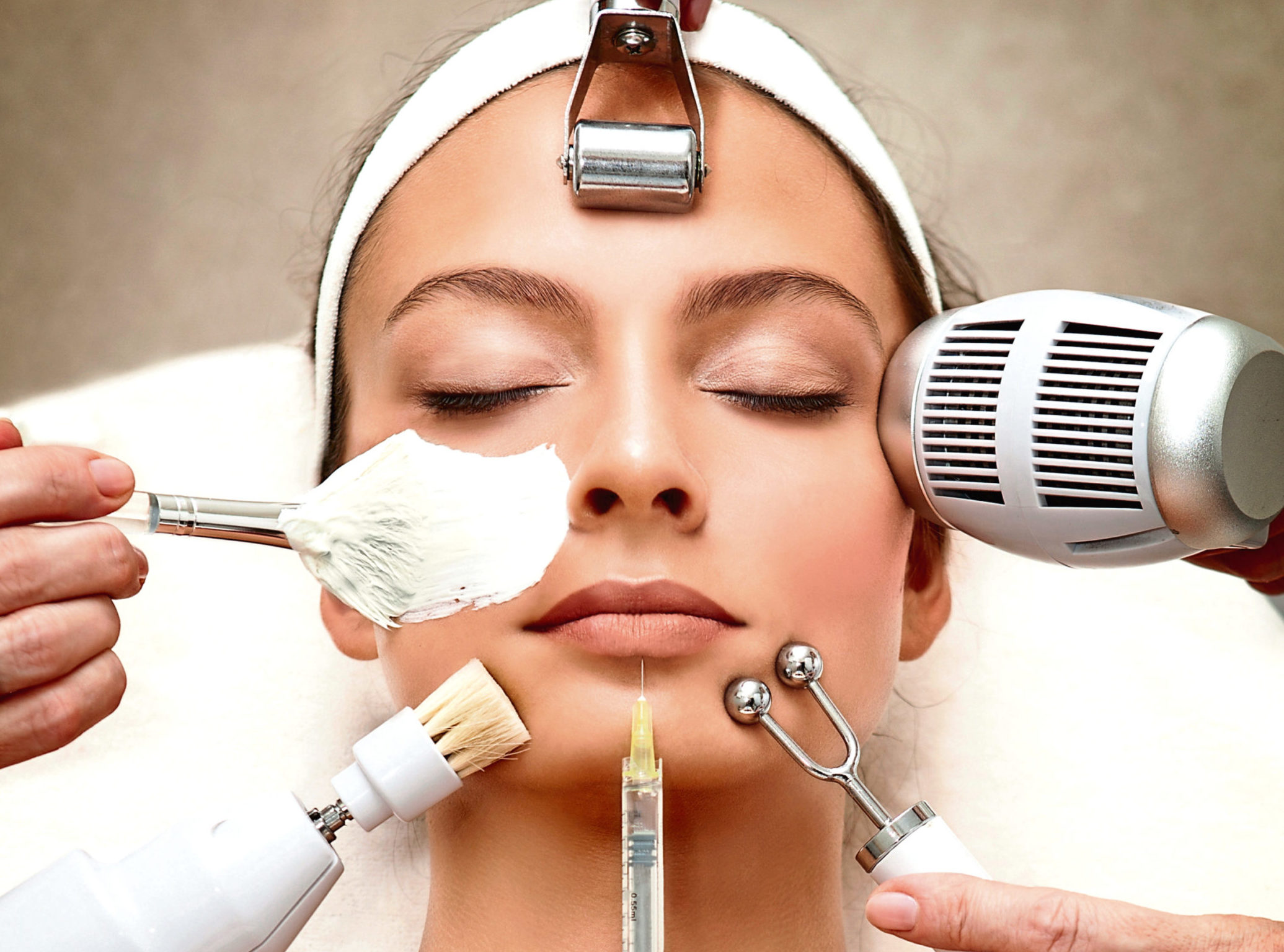
We have never looked at our faces so much and, experts have revealed, more and more Scots don’t like what they see.
We are scrutinising our looks more than ever since lockdown forced us to work and socialise in a virtual world of webcams and bad lighting.
And now, after months of peering at our own reflection in video calls, many of us have decided we don’t like the image staring back at us.
Cosmetic practitioners say “Zoom Face”, named after the popular online meeting app, is responsible for a marked increase in demand for anti-ageing treatments such as Botox and fillers compared with this time last year.
Dr Kieren Bong, whose clinic Essence Medical in Glasgow has seen a 15%-20% rise in inquiries for procedures, said: “What has prompted the majority of our patients to look for help from cosmetic surgery recently is they are spending more time on video meetings.
“When they look at themselves on the screen, they realise their complexion is dull or they have fine lines or wrinkles that weren’t there before. In the industry we call it Zoom Face.”
Taimur Shoaib, consultant plastic surgeon and owner of La Belle Forme clinic in Glasgow, saw a 27% rise in inquiries in lockdown and says many clients are using money they have saved from cancelled summer holidays to pay for treatments. He said: “We’ve seen an increase in bookings for Botox and fillers, as well as nose jobs and breast surgery.
“Staring at a computer screen makes us more aware of how a bad webcam can make us look to other people, especially when we can’t use a Snapchat filter to hide any minor imperfections in our skin and change some of the lighting we have in our kitchens when we’re Zooming colleagues. Camera angles from computers aren’t the best for hiding things like double chins and it also makes us look right up our nose – no wonder we’re thinking more than ever about our appearance.
“Many people have not gone on holiday this year, so they are spending the money on their appearance instead.”
And it may not be all in our heads. A recent survey, carried out by cosmetic brand Uvence, suggests more than six million Brits feel they look as if they have aged at least five years due to stress and anxiety since the pandemic outbreak.
Dr Bong said increased alcohol consumption during lockdown and sun exposure over the past few months have taken their toll too. He added: “People feel they have aged faster in lockdown and there are a few reasons, from lifestyle changes and stress to alcohol consumption, smoking and sun exposure – all things that age and dehydrate the skin.
“People have been going without make-up because they are at home but that can actually mean lots of people feel they don’t need to bother with a regular skincare routine. Cleansing, exfoliating and moisturising promotes cell renewal and hydrates the skin. So just because we are not wearing make-up does not mean we no longer need it.
“And we have tended to think that, just because we are not on holiday or out in the sun, we don’t need to wear sunscreen. But UV rays go through windows, so you still need sun block indoors. If you don’t wear it daily, there’s a chance of deteriorating complexion and signs of ageing.”
While Botox is a staple procedure, Dr Bon
g has also noticed an increase in other non-surgical options. “A growing portion of clients are looking to improve the health of their complexion,” he said.
“We can inject into the skin a hydrating serum which has hyaluronic acid, vitamins, minerals and antioxidants. It rehydrates the skin. And chemical skin peels are on the increase, too.”

Since the majority of office workers started working from home, thousands of YouTube tutorials on how to look good on Zoom calls have appeared online, attracting millions of hits.
P.S. fashion editor Wendy Rigg says there’s lots you can do to improve your appearance without having to resort to invasive and expensive procedures. “Unless you are a supermodel or a film star, it’s not the most comfortable feeling seeing yourself on video but it’s amazing what the right clothing or a bit of lighting can do,” she said.
“Seeing yourself in such sharp focus is not great and you do start to scrutinise yourself. I’ve had friends who have gone down the cosmetic surgery route but I don’t go near Botox.
“At the beginning of lockdown I dyed my hair pink and wore lots of eye make-up but I now think that less is more – mascara, a bit of concealer and a slick of lipstick is all that’s needed.
“My golden rules are to always have the webcam higher than your eyeline so you are looking slightly up at the camera, place a light source behind your screen to light your face to bleach out any wrinkles and – my secret weapon – hit the retouch button on Zoom as it removes all your imperfections.”
She added: “In some ways, though, I think we have become more forgiving of our faults since lockdown, which is quite freeing. When me and my friends get together on Zoom, we often don’t even bother doing our make-up or hair – we’re all in the same boat.”
Dr Asher Siddiqi, medical aesthetic expert at Transform Hospital Group, said it’s important for clients to realise that how they look on camera is not always how they look in real life. He said: “With cameras being the main way we’re communicating, people are looking at their own faces now more than ever have before. It can be very disconcerting, particularly when we’re seeing it up close and know there may be a virtual meeting room full of people also looking at our face the same way.
“While we are there to advise patients on the best way forward, if they are serious about wanting to make a change to their appearance, it is also important we highlight that seeing our faces on screens isn’t an exact reflection of our appearance in the ‘real world’, particularly when it can be easily distorted through an unflattering camera angle or poor lighting.
“We also must take into account their mental wellbeing as well as manage expectations and ensure there aren’t any other issues resulting in them wanting to change their appearance. This is such an important part of what we do and we often request a letter from their GP or have them undergo a psychological examination before moving forward.”
Jill Smith, aesthetics nurse and owner of Platinum Aesthetics and Beauty Clinic in Bathgate, agrees. “We have been experiencing returning existing patients seeking additional treatments,” she said.
“The industry has observed an increase in patients with the perception of poorer Botox results in comparison to pre-lockdown treatment outcomes. This may be due to a prolonged period between treatments as clinics closed, stress and other life-style factors. Many are now also using Microsoft Teams and Zoom as a means of communicating and perhaps scrutinising their facial features more.
“I believe, as professionals, it is important we remain mindful of managing patients with altered perceptions of self and body dissatisfaction post-lockdown. My concern is by attending non-regulated services, who have no accountability and ethical framework, people may be taken advantage off and vulnerabilities exploited.”

Enjoy the convenience of having The Sunday Post delivered as a digital ePaper straight to your smartphone, tablet or computer.
Subscribe for only £5.49 a month and enjoy all the benefits of the printed paper as a digital replica.
Subscribe